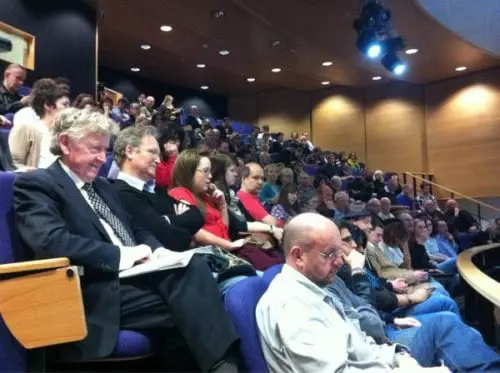Guest blog by Alan Lane
I’d gone to the Leeds Mayor debate with a completely open mind.
I am as political as the next person by which I mean I spend the whole of BBC Question Time shouting at the TV about Francis Maude and I listen to Today on radio 4 as often as my blood pressure will allow me.
I had received no information from any of the political parties when the event was announced (although in the interests of fairness a Lib Dem flyer has just come through the door- bless their yellow socks for still keeping going) so I thought the event was the best chance to learn enough to be able to make an informed decision.
The first comment from the floor was from a Councillor who threatened that an elected Mayor would stop funding to the arts. He didn’t offer any evidence for this. It frustrated me that in a public forum that people had attended in order to discuss ideas, a member of the existing system would start with so negative and unsubstantiated a comment.
It was the first of a series of frustrating contributions against elected mayors that relied upon a very strained piece of logic; namely that the Public that were wise enough when they elected the current group of Councillors, couldn’t be trusted to elect a Mayor lest their heads be turned by Bombasts and strutting Peacocks.
I am suspicious of an argument that requires the people to be wise in one instance, easily led in the next.
“We’d have to be very lucky to elect a competent Mayor” said Councillor John Illingworth. Given that the current leader of the council had said he would run if we decided to have an elected Mayor this struck me as a very defensive thing to say.
These arguments were often coupled with the insistence that the current system was serving us perfectly well. “If it’s not broke, don’t fix it” offered Mr Illingworth. I don’t need to have a low opinion of the Council (and for the record I really don’t) to think that this mighty city has room to become even more dynamic in a changing world.
Most frustrating was the repeated idea that the public don’t care about the issue- that this was all a waste of time and money because no one would care. And I remembered that I had not received a single piece of information about the issue from any of the political parties, yet had still come out to a free (organised by a citizen, unpaid and beyond party politics) discussion event in the evening and was being told by members of the existing system that the status quo should continue because it was the public that didn’t care. That made me very angry.
And I started to think that having an election that would force all the political parties to openly engage with the idea of the mayor and therefore the city would be no bad thing. That the fear of being bested by a popular local celebrity might force the quality of engagement higher, not lower.
A community leader who would not so proudly sit in public and say that people did not really care who ran their city might be a really great thing for a community.
And I started to think that this city having a champion who would be as eloquent, creative and dynamic as Leeds is was no bad thing. And that we as a city were as likely to vote for the best candidate as we were to vote for the right MP, the right councillor: Doncaster’s failing mayor is no more an argument against Mayors than Berlusconi is a reason to stop Italian democracy.
The most impressive speaker at the event was Hartlepool’s Mayor: personable, informed, clear, pleasant and absolutely focused on his priority: Hartlepool.
If Leeds had someone like that- who was reliant on communicating with the city to secure their political survival longterm- then we’d be a stronger city. There is of course the danger we would vote in an idiot. But that isn’t an argument for not doing it.
It’s an argument for us to choose wisely and for all candidates to communicate widely and honestly.
I have hope that a Mayor might shake up some complacencies on display at the debate and encourage popular communication about what future path Leeds might take. The arguments against are too entitled and too negative for me.
I’ll be voting yes.

Interesting comment about the arts.
In Louisville (our partner city in the USA) an elected mayor waived taxation to part of the cultural sector to enhance the city as an arts hub.
I agree – I suspect there will be poor mayors; but we’ve also had councils that have proven to be little more than a checksum for the bureaucrats.
If I was to be elected to represent a body of people I’d want a little more influence than that.